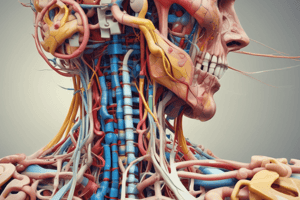Podcast
Questions and Answers
Which of the following constitutes the roots of the brachial plexus?
Which of the following constitutes the roots of the brachial plexus?
- C6-T2
- C5-T1 (correct)
- C1-C4
- C5-C7
What characterizes Erb’s Palsy?
What characterizes Erb’s Palsy?
- Bird winging of scapula with a forward rotated shoulder (correct)
- Claw-like hand with hyperextension of wrist
- Medial winging of scapula with arm adduction
- Atrophy of the forearm muscle without wrist deformity
Which statement correctly describes Klumpke’s Palsy?
Which statement correctly describes Klumpke’s Palsy?
- Injury involves C5 and C6 roots.
- It results in a forward rotated shoulder.
- It affects the upper limbs only.
- It presents with a claw-like hand. (correct)
What is a common consequence of thoracic outlet syndrome?
What is a common consequence of thoracic outlet syndrome?
Which nerve is primarily associated with winging of the scapula?
Which nerve is primarily associated with winging of the scapula?
Which of the following is NOT a cause of brachial plexus plexopathies?
Which of the following is NOT a cause of brachial plexus plexopathies?
Which of the following components makes up the cords of the brachial plexus?
Which of the following components makes up the cords of the brachial plexus?
What is usually the first response to a brachial plexus injury?
What is usually the first response to a brachial plexus injury?
Flashcards are hidden until you start studying
Study Notes
Brachial Plexus Overview
- Network of nerves located in the neck and axilla, essential for upper limb innervation.
- Formed by the ventral rami of cervical roots C5 to T1.
- Comprised of roots (C5-T1), trunks (superior C5-C6, middle C7, inferior C8-T1), divisions (anterior and posterior), and cords (medial, lateral, posterior).
Important Nerves and Their Functions
- Major nerves derived from the brachial plexus:
- Axillary nerve: Innervates deltoid and teres minor.
- Radial nerve: Controls extensor muscles of the arm and forearm.
- Median nerve: Innervates flexor muscles of the forearm and hand.
- Ulnar nerve: Responsible for intrinsic hand muscles.
- Musculocutaneous nerve: Innervates the biceps brachii and brachialis.
Branches from Roots
- Dorsal scapular nerve: Innervates rhomboid muscles and levator scapulae.
- Long thoracic nerve: Supplies serratus anterior, with injury leading to medial scapular winging.
- Medial and lateral pectoral nerves: Innervate pectoralis minor and major.
- Thoracodorsal nerve: Supplies teres major.
Plexopathies and Injuries
- Types of brachial plexus injuries include:
- Erb’s Palsy: Caused by upper plexus injury (C5-C6). Presents with:
- Bird winging of the scapula.
- Forward rotated shoulder.
- Waiter-tip deformity of the wrist.
- Klumpke’s Palsy: Results from lower plexus injury (C8-T1). Characterized by:
- Claw-like hand appearance due to intrinsic muscle involvement.
- Supinated forearm.
- Hyperextension of wrist and MCP joints.
- Erb’s Palsy: Caused by upper plexus injury (C5-C6). Presents with:
- Injury types can vary from avulsion, complete cut, to stretching.
- Stretching injuries often resolve in weeks, while avulsion injuries may require surgical intervention.
Thoracic Outlet Syndrome (TOS)
- TOS encompasses conditions with nerve or blood vessel compression between the neck and shoulder.
- Symptoms can include:
- Shoulder and neck pain.
- Numbness in fingers.
- Management includes physiotherapy, rehabilitation, and occasionally steroids for inflammation.
Studying That Suits You
Use AI to generate personalized quizzes and flashcards to suit your learning preferences.




